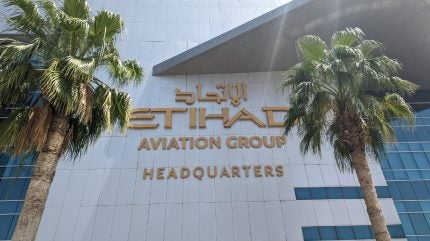
UAE-based airline Etihad has said investing into its fleet is one of the most important things it can do in regards to sustainability.
Speaking to Energy Monitor’s sister site Airport Technology during a visit to the Etihad headquarters in Abu Dhabi, chief revenue and commercial officer Arik De said that burning less fuel overall was a key focus for reducing the airline’s impact on the environment.
He said: “If you don’t invest in your fleet and get new aircraft coming in, irrespective of what you do and what conversations are happening globally around fuel, you’re going to be burning 15 – 20% more fuel.
“So the commitment we have right now, and the single most important focus we have is getting those new planes coming in and getting them as fast as possible.”
Etihad, which is targeting net zero emissions for 2050, currently operates an 86-strong fleet and has another roughly 100 aircraft on order across a range of models including Airbus’ A321neo and A350-1000s and Boeing’s 777-9 and 787-10s.
All of the aircraft have been positioned by the manufacturers as more efficient replacements to previous models, with claims of per-seat fuel burn reductions of up to around 20%.
De’s focus on new aircraft is particularly notable in the midst of the fallout between major European airlines and the EU after the European Commission began action against 20 companies for “misleading greenwashing practices”, including promotion of sustainable aviation fuel (SAF).
SAF has become a key focus for much of the airline industry thanks to its 20% reduction in emissions compared to traditional jet fuel but has also been criticised due to a lack of infrastructure making it more difficult and expensive to procure, with airlines currently using it in small blends of less than 10%.
In addition to aircraft orders, De, who stepped up to the CRCO role in December 2023, said that Etihad’s conscious choices programme, where loyalty scheme customers can gain more points with more sustainable choices, also showed its push towards more environmentally friendly operations.
With a take-up rate of around 35-40%, De said that while they can’t know if a customer chooses the programme out of a desire to be more sustainable vs just earning extra points, “all we can do is influence the behaviour for a greater good.”



